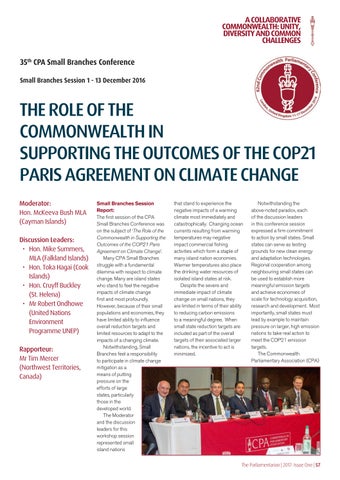A COLLABORATIVE COMMONWEALTH: UNITY, DIVERSITY AND COMMON CHALLENGES 35th CPA Small Branches Conference Small Branches Session 1 - 13 December 2016
THE ROLE OF THE COMMONWEALTH IN SUPPORTING THE OUTCOMES OF THE COP21 PARIS AGREEMENT ON CLIMATE CHANGE Moderator: Hon. McKeeva Bush MLA (Cayman Islands) Discussion Leaders: • Hon. Mike Summers, MLA (Falkland Islands) • Hon. Toka Hagai (Cook Islands) • Hon. Cruyff Buckley (St. Helena) • Mr Robert Ondhowe (United Nations Environment Programme UNEP) Rapporteur: Mr Tim Mercer (Northwest Territories, Canada)
Small Branches Session Report: The first session of the CPA Small Branches Conference was on the subject of ‘The Role of the Commonwealth in Supporting the Outcomes of the COP21 Paris Agreement on Climate Change’. Many CPA Small Branches struggle with a fundamental dilemma with respect to climate change. Many are island states who stand to feel the negative impacts of climate change first and most profoundly. However, because of their small populations and economies, they have limited ability to influence overall reduction targets and limited resources to adapt to the impacts of a changing climate. Notwithstanding, Small Branches feel a responsibility to participate in climate change mitigation as a means of putting pressure on the efforts of large states, particularly those in the developed world. The Moderator and the discussion leaders for this workshop session represented small island nations
that stand to experience the negative impacts of a warming climate most immediately and catastrophically. Changing ocean currents resulting from warming temperatures may negative impact commercial fishing activities which form a staple of many island nation economies. Warmer temperatures also place the drinking water resources of isolated island states at risk. Despite the severe and immediate impact of climate change on small nations, they are limited in terms of their ability to reducing carbon emissions to a meaningful degree. When small state reduction targets are included as part of the overall targets of their associated larger nations, the incentive to act is minimized.
Notwithstanding the above-noted paradox, each of the discussion leaders in this conference session expressed a firm commitment to action by small states. Small states can serve as testing grounds for new clean energy and adaptation technologies. Regional cooperation among neighbouring small states can be used to establish more meaningful emission targets and achieve economies of scale for technology acquisition, research and development. Most importantly, small states must lead by example to maintain pressure on larger, high emission nations to take real action to meet the COP21 emission targets. The Commonwealth Parliamentary Association (CPA)
The Parliamentarian | 2017: Issue One | 57
